Esomeprazole
Treat acid reflux quickly and effectively with esomeprazole capsules, which work by reducing the amount of acid in your stomach.
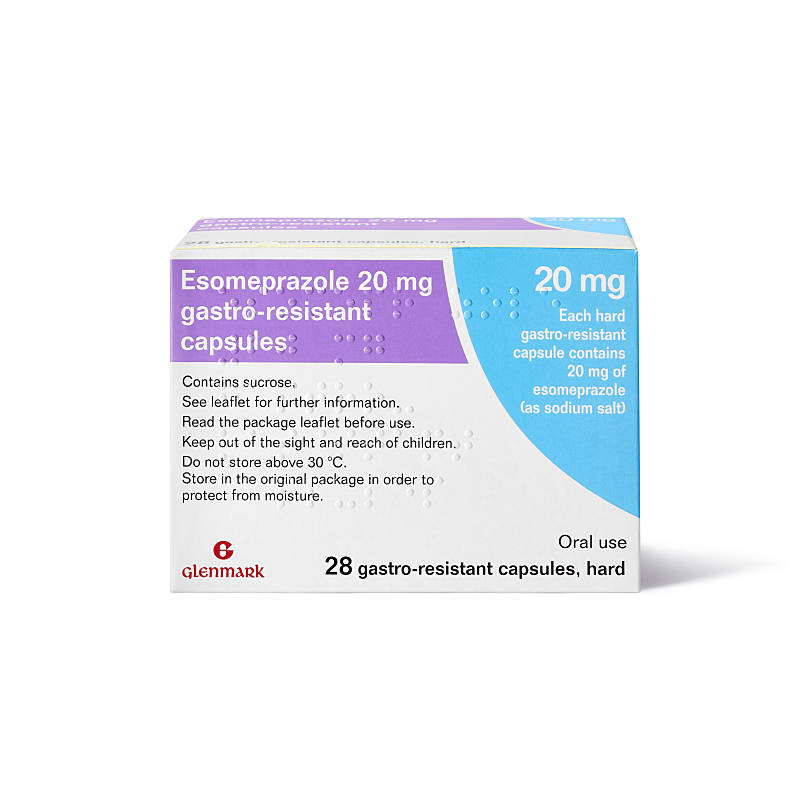





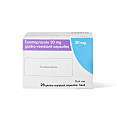
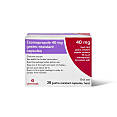
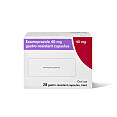
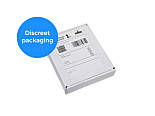
Prices from £15.00
In stock. Simply fill in a brief questionnaire. One of our doctors will review your order and prescribe a suitable treatment. How to Order
-
Esomeprazole is a type of medication called a proton pump inhibitor (PPI) that is widely used to treat conditions such as acid reflux, heartburn and indigestion, as well as gastro-oesophageal reflux disease (GORD). It does this by reducing the amount of acid your stomach produces to stop acid reflux from occurring. It’s a fast and effective treatment that’s available in multiple doses to suit your needs. It can be used short-term or long-term, depending on what your doctor thinks is most suitable for you.




About esomeprazole
-
-
You can buy esomeprazole online from trusted and regulated websites that prescribe and issue treatments, such as Asda Online Doctor. To get esomeprazole online through our service, request your chosen dosage and complete a simple questionnaire about your health. A doctor will check your answers and prescribe esomeprazole if suitable. Once your order is approved, it’ll either be sent to your home, or you can collect it from a convenient Asda Pharmacy.
-
-
Esomeprazole is a proton pump inhibitor (PPI) that’s most commonly used to treat conditions like acid reflux, heartburn, and gastro-oesophageal reflux disease (GORD). It can also be used to treat other conditions linked to excessive stomach acid, such as Zollinger-Ellison syndrome. While taking esomeprazole does relieve the symptoms of heartburn, it shouldn’t be used for instant relief.
Esomeprazole vs omeprazole
Esomeprazole and omeprazole are both the same type of medication (PPIs) and are used to treat frequent episodes of heartburn, acid reflux, GORD and other conditions triggered by excess stomach acid. Both medications can be purchased over the counter and research suggests that they have the same overall effects. Studies tend to suggest that there is very little difference between these two medications and how they work, but there is some evidence to suggest that esomeprazole works faster and lasts longer than omeprazole. At the end of the day, choosing between these medications will usually come down to your doctor's decision, your preference or what is most affordable for you. They are both very effective and safe medications to take.
-
-
Esomeprazole tablets work by reducing the amount of acid your stomach produces. They do this because they are a type of medication called a proton pump inhibitor (PPI). This type of medication affects your proton receptors, which can be found in the lining of the stomach, and these play a role in stomach acid production. PPIs, like esomeprazole, bind to these receptors and stop them from working properly, which prevents the production of stomach acid. Stopping the production of stomach acid stops what’s causing the symptoms of conditions like acid reflux.
How long does esomeprazole take to work?
Esomeprazole starts working straight away, and you should start to feel the effects of the medication within 2-3 days of taking it. However, some people can continue to experience high levels of stomach acid up to 4 weeks after starting their treatment. If you’ve purchased esomeprazole over the counter without a prescription and you don’t start to feel better after 2 weeks of taking the medicine, then you should contact your doctor. They may want to try an alternative treatment or investigate further to rule out any underlying causes.
-
-
- If you have been told to take 1 esomeprazole tablet a day, take it first thing in the morning on an empty stomach with a glass of water.
- If you have been told to take 2 esomeprazole tablets a day, take 1 in the morning when you get up, and 1 at night before you go to sleep.
- Do not lie down immediately after taking esomeprazole.
Your dosage will be decided by your doctor and will depend on the reason you're taking it, your health and your age. You should always take esomeprazole as prescribed by your doctor.
Esomeprazole and alcohol
While alcohol does not impact the effectiveness of esomeprazole or how it works, it does affect stomach acid production, causing it to produce more acid than usual. This can lead to irritation of the stomach lining, which can worsen your symptoms.
How often can I take esomeprazole?
You can take esomeprazole no more than twice a day. Your doctor or pharmacist will advise you on how often you should take it, and they will recommend a dosage. In some cases, you will be told to take a dose only when you experience symptoms.
You should never take a double dose of esomeprazole to make up for a missed dose.
If you think you’ve taken too much esomeprazole, then you should contact your doctor.
How long should I take esomeprazole for?
You should take esomeprazole for as long and as often as your doctor recommends. If they’ve prescribed it to you, this could be a few weeks to a few months and will be determined by the condition being treated. If you have bought esomeprazole over the counter and your symptoms haven’t improved after taking it for 2 weeks, then you should speak to your doctor. They may carry out further tests to ensure you’re getting the best treatment.
Esomeprazole dosage
Esomprazole comes in 2 dosages, 20mg and 40mg. You can purchase a 20mg dose over the counter, but if you want a 40mg dose, you will require a prescription from your doctor.
The best dosage for you will be determined by your medical condition. For example, heartburn and acid reflux is often treated with 20mg a day, whereas doses up to 40mg will be recommended for those with GORD.
-
-
Most adults can take esomeprazole. However, if you have severe liver disease, your body may be unable to process the drug. Children should only have esomeprazole if it has been prescribed by a doctor.
-
-
While most people who take esomeprazole won’t experience side effects, those that do will often experience different things. If you notice any side effects, they will often be mild at first and will go away once you stop taking the medication.
Common, mild side effects of esomeprazole that affect 1 in 100 people include:
- constipation
- diarrhoea
- headaches
- nausea
- stomach pain
- vomiting
- wind
If these side effects bother you or don’t subside, then you should talk to a pharmacist or doctor.
Side effects that are more severe but less common, affecting less than 1 in 1000 people include:
- abnormal skin changes such as a raised rash, redness and blistering and joint pain
- extreme tiredness followed by yellow skin and dark urine
These side effects can be a sign of a rare condition known as subacute cutaneous lupus erythematosus or the symptoms of liver problems. So, if you do get these, you should speak to your doctor right away.
Some people can experience a serious allergic reaction called anaphylaxis when taking esomeprazole, but this is rare. If you experience any serious side effects, then you should call your doctor immediately or head to A&E.
Are there any long-term side effects?
If you’ve taken esomeprazole for over 3 months, it can cause the concentration of magnesium in your blood to drop, which can lead to confusion, dizziness, muscle twitches, an irregular heartbeat and tiredness. You should speak to your doctor if you notice these symptoms after taking esomeprazole for an extended period. While there is no evidence to suggest that long-term use of esomeprazole will reduce its effectiveness, if you feel like it isn’t working as well as it did at the start, contact your GP.
-
-
You should also tell your doctor if you’re taking any of the following medications before using esomeprazole, as they could interact with it:
- antidepressants – citalopram, clomipramine, escitalopram or imipramine
- antifungal medicines – itraconazole, ketoconazole or posaconazole
- blood-thinning medicines – clopidogrel
- cilostazol for painful legs
- digoxin – heart medicine
- HIV medicines
- phenytoin for epilepsy
- methotrexate for cancer, psoriasis or rheumatoid arthritis
- rifampicin – antibiotic
- tacrolimus for eczema or to prevent organ rejection
If you are under 18, pregnant or breastfeeding, then you shouldn’t take esomeprazole without a doctor's advice. If you have liver problems, can’t absorb certain sugars, are due to have an endoscopy, or experienced an allergic or bad reaction to the medication in the past, then it may not be suitable for you.
While you can eat normally when taking esomeprazole, you should reduce your intake of fatty food, spicy foods, caffeine, and alcohol. While these foods and drinks won’t change how effective esomeprazole is, they are known for leading to the production of excess stomach acid. If you are struggling with acid reflux from eating or drinking certain things while taking esomeprazole, you can also take antacids like Gaviscon 2 hours before or after esomeprazole.
-
-
There are 4 alternative proton pump inhibitors available that work in a similar way to esomeprazole and are just as effective. They include:
- omeprazole
- lansoprazole
- pantoprazole
- rabeprazole
If you feel like esomeprazole doesn’t work for you, then your doctor may recommend one of the above to reduce stomach acid production. If you’re looking for a natural alternative, consider chamomile, marshmallow root, slippery elm, and ginger root. These may be able to relieve some of your symptoms, but there isn’t much clinical research to support this.
-
-
When is the best time to take esomeprazole?
It’s best to take esomeprazole first thing in the morning on an empty stomach with water. Ideally, you should avoid lying down immediately after taking the medication. If you have been told to take 2 doses, then you should take one first thing and one in the evening.
How long does esomeprazole stay in your system after you stop taking it?
Esomeprazole is usually out of your system within 3-4 hours of taking it. This is because the liver completely metabolises it, and it has a half-life of less than an hour.
Can you buy esomeprazole over the counter?
You can purchase esomeprazole 20mg gastro-resistant tablets over the counter, but if you need a higher dosage, then you will need a prescription from your GP. This is because a higher dose may not be suitable for people of a certain age and those with specific medical conditions.
Can you get esomeprazole on the NHS?
Yes. It’s possible to get all doses and types of esomeprazole on the NHS.
Can I take esomeprazole with other heartburn medication?
If you have taken esomeprazole and you are still experiencing symptoms of indigestion, heartburn or acid reflux, then you can take an antacid 2 hours before or after your dose of esomeprazole. It can take several days for esomeprazole to work once you start taking it.
What is the difference between lansoprazole, omeprazole and esomeprazole?
All of these medications are PPIs and work in the same way. The main differences between them are the amount of time they take to work, and their possible side effects, which can vary from person to person.
The best medication for you will be determined by your symptoms and reaction to the treatment, any side effects you get, and the cost. Both esomeprazole and lansoprazole have been seen to work faster than omeprazole. However, omeprazole is said to be more effective in reducing acidity compared to lansoprazole.

Babak studied medicine at King’s College London and graduated in 2003, having also gained a bachelor’s degree in Physiology during his time there. He completed his general practice (GP) training in East London, where he worked for a number of years as a partner at a large inner-city GP practice. He completed the Royal College of GPs membership exam in 2007.
Meet our doctorsArticle created: 11 Jan 2023
-
Esomeprazole (2018) NHS [accessed 10 November 2022]
-
Esomeprazole (2021) RxList [accessed 10 November 2022]
-
Esomeprazole Capsules (2022) Advacare Pharma USA [accessed 10 November 2022]
-
Esomeprazole (Oral Route) (2022) Mayo Clinic [accessed 10 November 2022]
-
Natural home remedies for heartburn (2019) WebMD [accessed 10 November 2022]


GMC: 7074021

GMC: 6149061

GMC: 7085115







